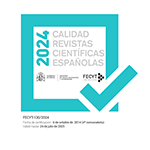Tacitism and Imperialism in the Golden Century: 'The Life of Agricola' in the 'Conquista de las islas Malucas', by Bartolomé Leonardo de Argensola
Abstract
This paper is intended as a contribution to the research line inaugurated by Prof. Beatriz Antón about Tacitism in 17th-Century Spain, and it provides one more sample of the existence, prior to the first Spanish translation by Emmanuel Sueyro, of an active Tacitist circle. One of their members, Bartolomé Leonardo de Argensola, uses The Life of Julius Agricola, by Tacitus, as an interpretive code of his work Conquista de las islas Malucas (Conquest of the Moluccan Islands), published in 1609. This key to reading equates the symbolic value of the Spanish conquest of these islands in current Indonesia, in 1606, with that of Britain by Tacitus' own father-in-law. Major elements in the intertextual relationship are two speeches taken from The Life of Julius Agricola and attributed to the Moluccan rebels against Portuguese imperialism. As a general rule, Argensola has obviously studied the original speeches, drawn their main ideas out and fitted them into the particular fabric of his narrative. In some case, though, Argensola's text is so close to its source that we are allowed to consider it a proper translation.
Downloads
Article download
License
In order to support the global exchange of knowledge, the journal Cuadernos de Filología Clásica. Estudios latinos is allowing unrestricted access to its content as from its publication in this electronic edition, and as such it is an open-access journal. The originals published in this journal are the property of the Complutense University of Madrid and any reproduction thereof in full or in part must cite the source. All content is distributed under a Creative Commons Attribution 4.0 use and distribution licence (CC BY 4.0). This circumstance must be expressly stated in these terms where necessary. You can view the summary and the complete legal text of the licence.








